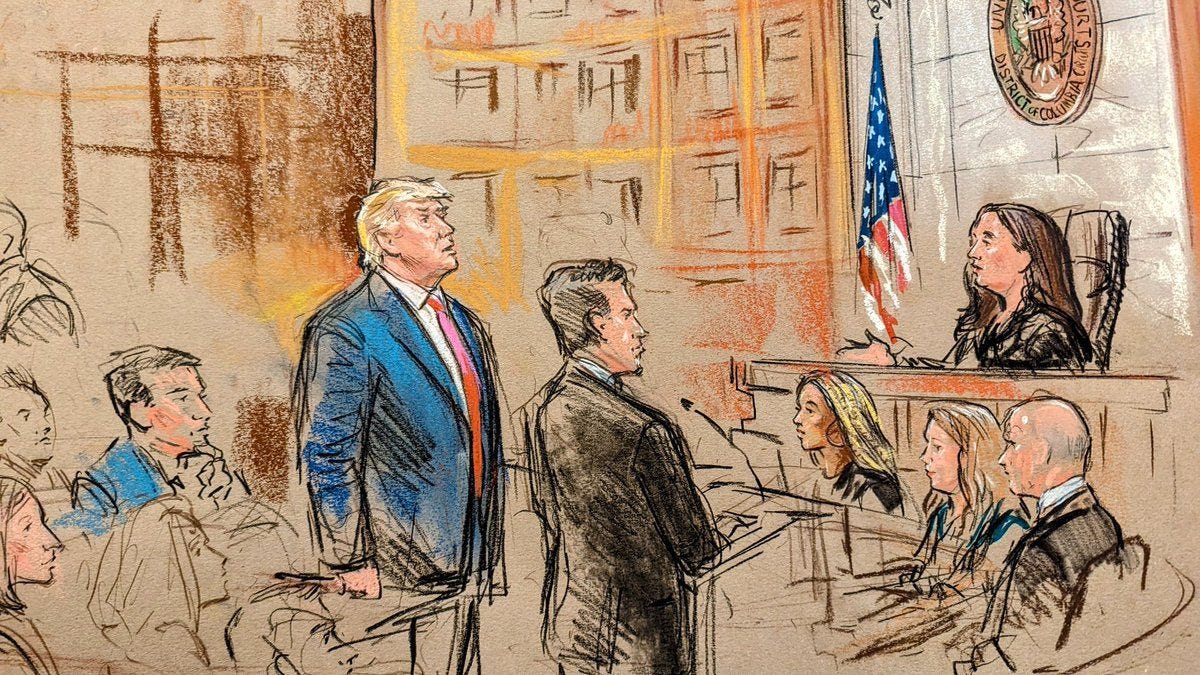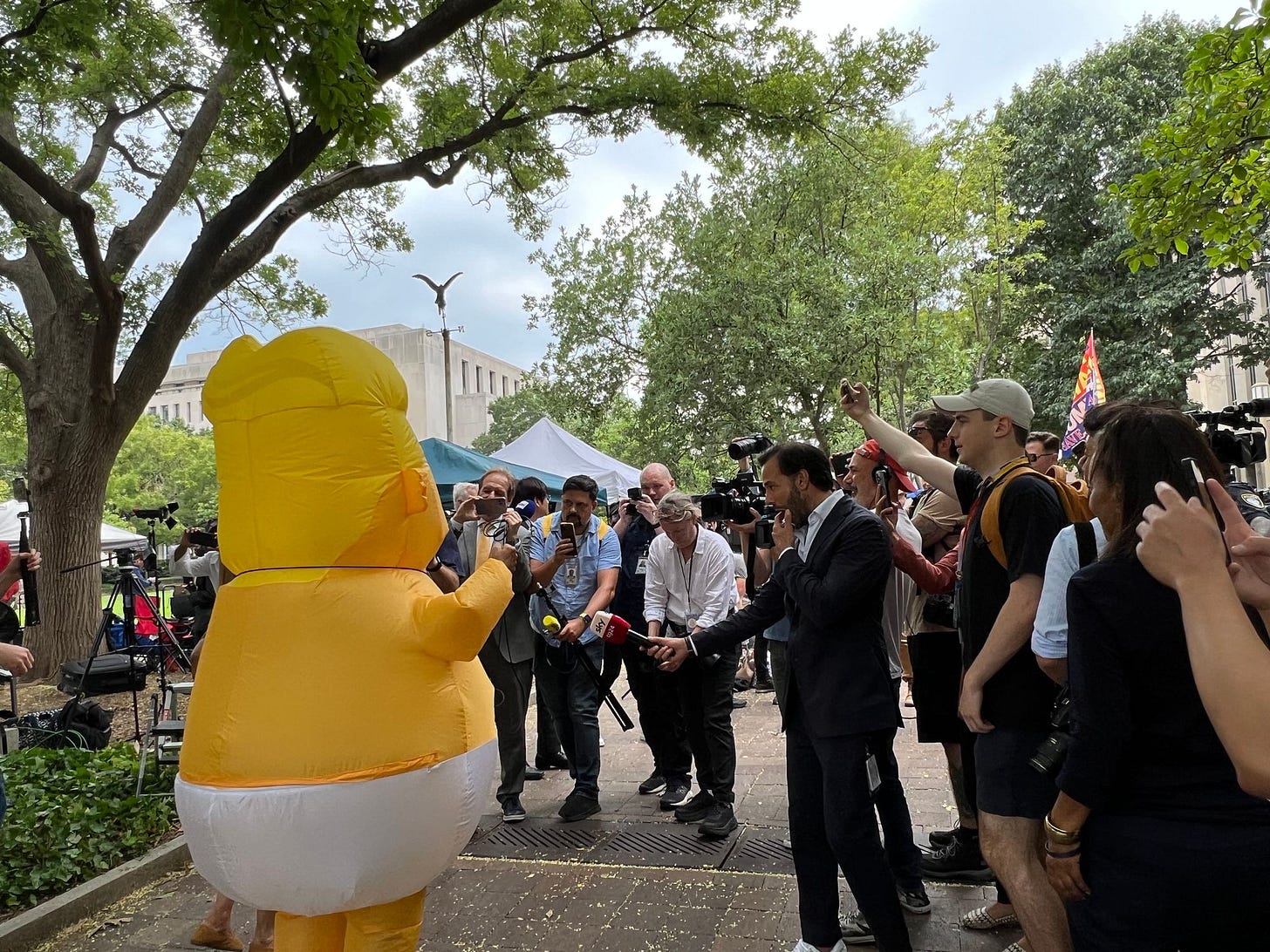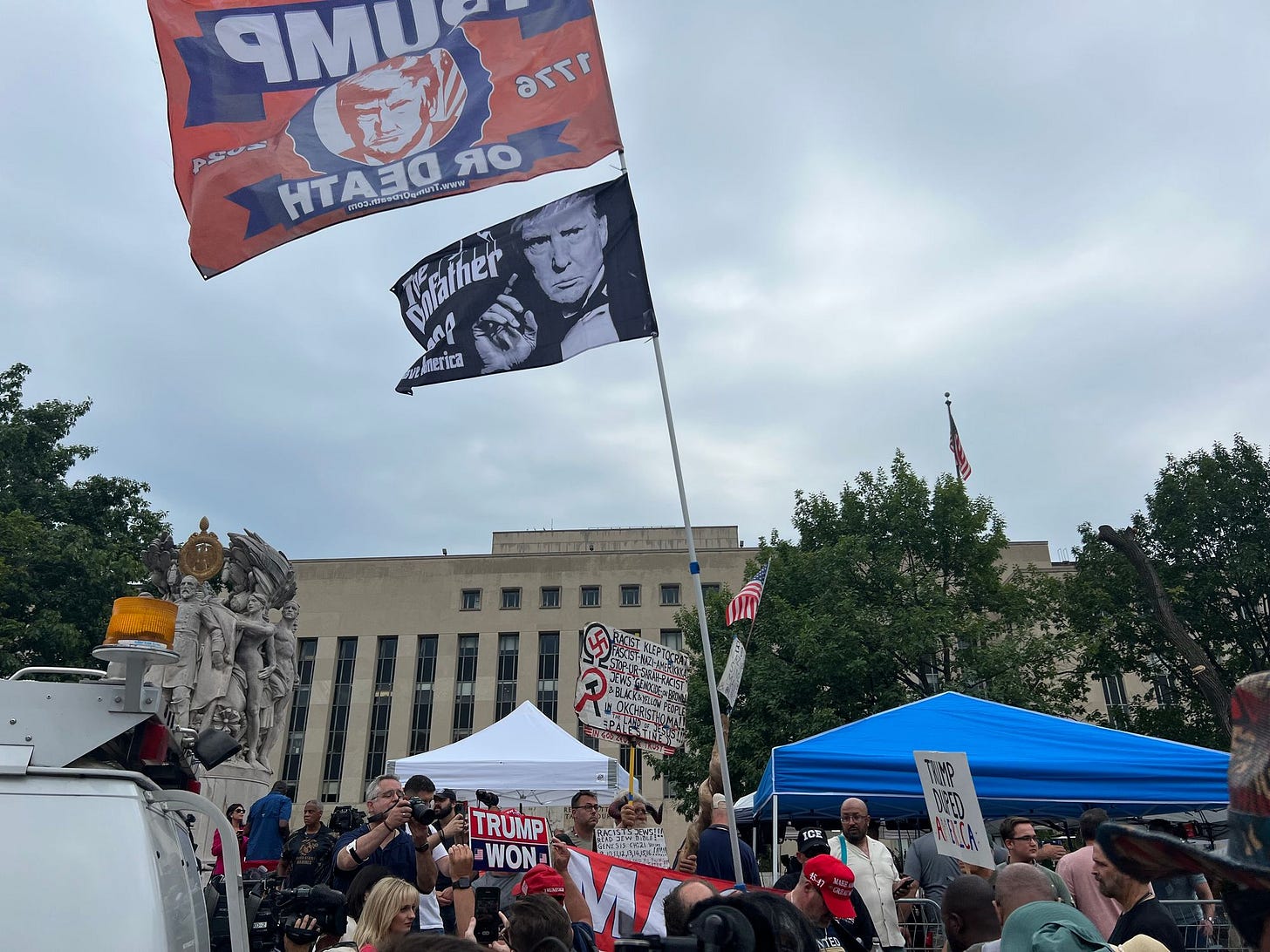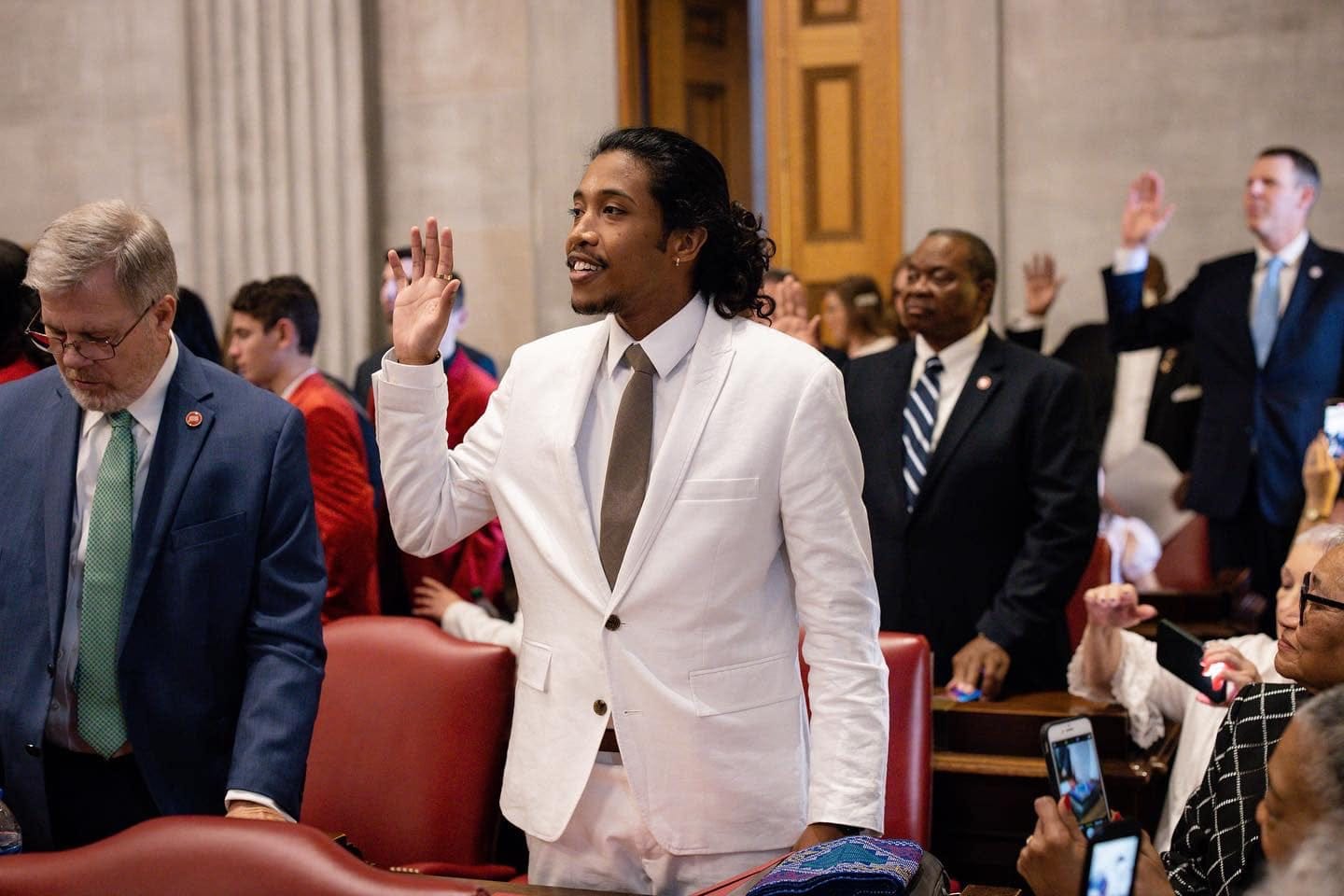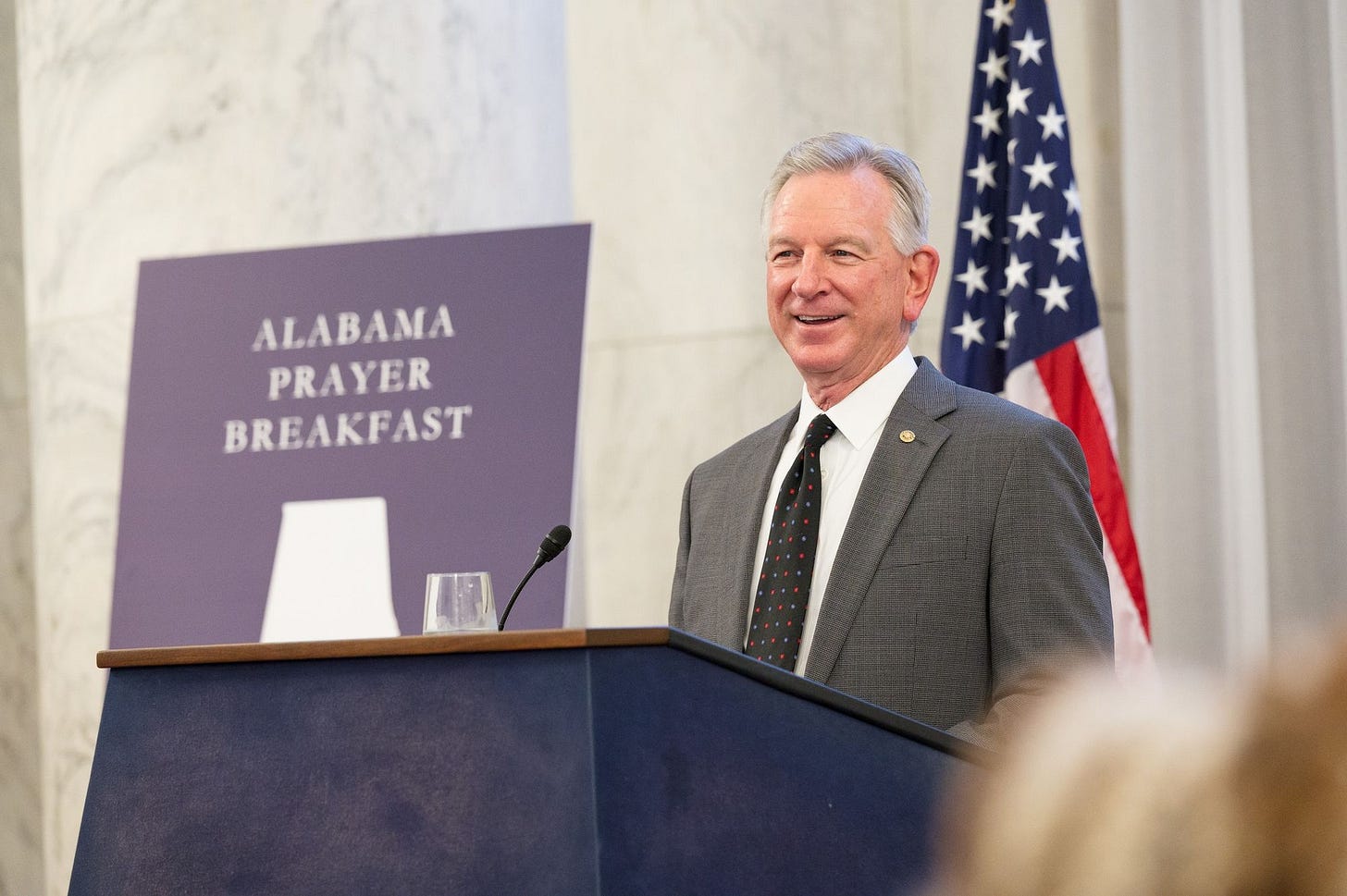Scenes from a presidential arraignment
Reporting from outside a historic arraignment that was at once remarkable and completely ordinary.

Good morning! It’s Friday, August 4, 2023. Yesterday, as Donald Trump was arraigned here in Washington, I was outside the courthouse, ready to capture the historic scene. If you want to support my ability to report on events like this one, I hope you’ll consider donating to Wake Up To Politics and telling your friends to subscribe. Thanks for reading; have a great weekend.
Donald Trump pleaded not guilty on Thursday to four charges of attempting to overturn the 2020 election.
According to reporters inside the room, the proceedings were brief and businesslike, just like his two previous arraignments. Trump entered his plea and agreed not to discuss the case with any witnesses. The government did not request that Trump be detained or that his travel be restricted. The next hearing in the case was set for August 28, five days after the first Republican debate.
Trump was apparently irked that the judge referred to him as “Mr. Trump,” not “Mr. President.” In an unusual sight, several federal judges were spotted sitting in the back row, apparently not wanting to miss their brush with history.
Outside the courtroom, the scene was calm and civil. A few hundred demonstrators — both Trump supporters and antagonists — were present, but it appeared quieter even than the circus-like atmospheres reported at his arraignments in New York and Miami, which were themselves quieter than expected.
Journalists — crowded in white tents, organized by media outlet — at times seemed to outnumber protesters. Each time a new demonstrator would appear, they were immediately swarmed by reporters and photographers, desperate to capture anything outside the ordinary. At one point, even a man dressed in an inflatable Trump baby costume attracted a media scrum that would make some congressmen jealous.
Like much of Trump’s time on the political stage, it felt at once remarkable and par-for-the-course: here we were at Trump’s third arraignment in four months, together the only times in history a former president has faced criminal charges, directly in the midst of his campaign to retake the White House. But, then again, it was his third arraignment in four months: nothing we hadn’t seen two times before.
Only Trump could make a presidential arraignment feel so ordinary.
For me, at least, the most striking presence outside the arraignment — more than the “Indictment Celebration” guitarist or the pro-Trump man in an Uncle Sam costume leading the National Anthem — wasn’t a protester at all. It was the Capitol building, which stood just a stone’s throw from the courthouse, looming over the proceedings.
The Capitol, of course, was the site of the January 6th attack that figures prominently in Trump’s latest indictment — where, prosecutors allege, he “directed” thousands of his supporters so he could “exploit the violence and chaos” in order to delay the certification of his defeat.
The nearby dome served as a reminder of a brief moment in recent history when it seemed regular political violence actually might return, in a way this country hasn’t seen since the spate of riots and political assassinations of the 1960s. Indeed, there was a point when conventional wisdom held that Donald Trump couldn’t be indicted, for January 6th-level riots would break out as soon as prosecutors filed the papers.
But now it has happened three times — with a fourth likely on the way — and protests barely took place each time outside the courthouses, much less across the country. There was a large police presence outside the D.C. court on Thursday — barricades, cops on foot and horseback — but they had little to do. Without much in the way of disorder, their job seemed mainly limited to keeping protesters contained on the sidewalks, so as not to interrupt the flow of traffic.
Perhaps Trump supporters were scarred from the last time they organized a protest in Washington (most January 6th trials have taken place inside that very same courthouse, after all). Or perhaps the energy just isn’t there: even as Trump commands majority support in the Republican primary, he no longer commands a following ready to protest at his say-so. Many of the more militant groups present at January 6th have fractured since the riot, with their leaders largely behind bars.
Following the arraignment, Trump didn’t make any impromptu stops in Washington, like his visit to a Cuban café after his arraignment in Miami. He went straight to the airport, where he delivered a brief statement to reporters under drizzling rain. If he had noticed the arraignment’s proximity to the Capitol, he didn’t comment on it. His only reflection on returning to D.C. was that the city had grown dirtier.
“This is a very sad day for America, and it was sad seeing the filth and decay in Washington, D.C.,” Trump said. “This is not the place that I left.”
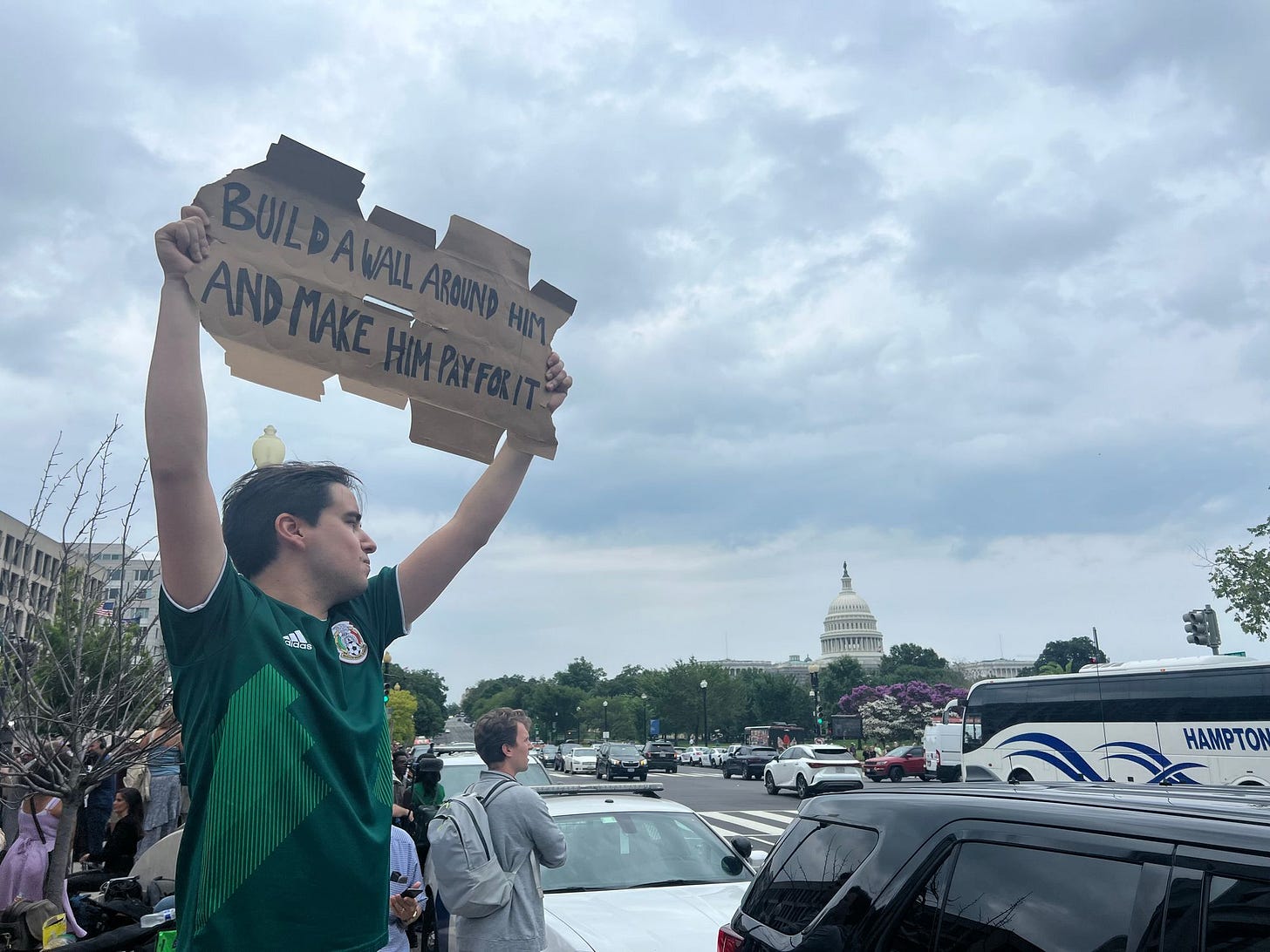
Adding to the strange sense of calm after Trump’s indictments has been that so few of his opponents — either Democrat or Republican — have sought to make much hay of them, something else you wouldn’t have expected. In normal times, the indictment of a rival would present a perfect political opportunity to capitalize off of (or at least address), but Trump’s have passed without much attention being drawn to them by other politicians, who continue to skirt as nervously around Trump as they have for 8+ years.
On January 6th itself, Biden delivered remarks while the Capitol riot was still playing out, beating Trump to the cameras — perhaps his first presidential moment, even before he was sworn in. But on the day of Trump’s January 6th arraignment, Biden evinced no such urgency. As he had for the three previous days, Biden went biking in Rehoboth Beach, speaking to reporters only to tell them that he would not be following the arraignment.
Perhaps it was politically wise to let the indictments speak for themselves, but it still felt somewhat dissonant for the president to bike silently while his predecessor was arraigned for attempting to overthrow the government. Biden’s most extended statement this week has been “It was compelling” — referring not to the indictment but to the movie “Oppenheimer,” which he took in with his wife at a local theater.
On the Republican side, the indictments have made more of a splash — they’re partially responsible for Trump’s high level of support in the primary — but few of his GOP rivals have even tried to dent that surge by attempting to turn the indictments into a liability for him. Most of the higher-polling GOP candidates attacked Biden’s administration for going after Trump; Vivek Ramaswamy, now polling third nationally, went so far as to file a lawsuit against the Justice Department in support of his opponent.
One exception, this time around, has been former Vice President Mike Pence, a main character in the indictment. Pence attacked Trump after the charges; he is now selling “You’re too honest” merch, memorializing the phrase Trump flung at him after he refused to do his bidding on January 6th.
Meanwhile, Ron DeSantis’ team bemoans that he can’t just receive criminal charges as well. “We got to find some judge in Florida that’ll indict DeSantis quick, to close this indictment gap,” Kentucky Rep. Thomas Massie, one of DeSantis’ few congressional endorsers, joked this week.
Trump seems to agree with that thinking, viewing the indictments as his ingredient for victory. “I NEED ONE MORE INDICTMENT TO ENSURE MY ELECTION!” Trump bellowed Thursday on Truth Social.
More news to know.
The U.S. economy added 187,000 jobs last month, solid but fewer than expected. The unemployment rate fell to 3.5%.
Chris Christie made a surprise trip to Ukraine, meeting with Volodymyr Zelensky.
The judge in Trump’s documents case, Aileen Cannon, made multiple errors in a trial earlier this year.
Justin Jones and Justin Pearson, the two Tennessee Democrats who were expelled from the state legislature in April, were re-elected to their seats.
The day ahead.
At the White House: President Biden will travel from Rehoboth Beach, Delaware, to Wilmington Delaware, continuing his vacation from another of his homes.
Vice President Harris will deliver remarks on “Bidenomics” in southeast Washington, D.C. Second Gentleman Doug Emhoff will headline a campaign fundraiser.
On the campaign trail: Donald Trump will deliver his first campaign speech since his third indictment, addressing the Alabama Republican Party’s annual fundraising dinner. Sen. Tommy Tuberville (R-AL) will introduce him.
Thanks for reading.
I get up each morning to write Wake Up To Politics because I’m committed to offering an independent and reliable news source that helps you navigate our political system and understand what’s going on in government.
The newsletter is completely free and ad-free — but if you appreciate the work that goes into it, here’s how you can help:
Donate to support my work or set up a recurring donation (akin to a regular subscription to another news outlet).
Buy some WUTP merchandise to show off your support (and score a cool mug or hoodie in the process!)
Tell your family, friends, and colleagues to sign up at wakeuptopolitics.com. Every forward helps!
If you have any questions or feedback, feel free to email me: my inbox is always open.
Thanks so much for waking up to politics! Have a great day.
— Gabe



